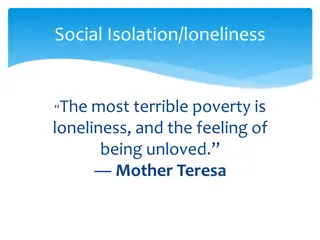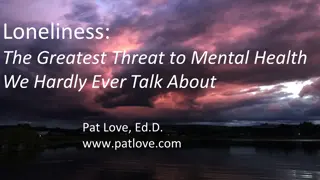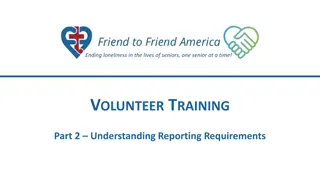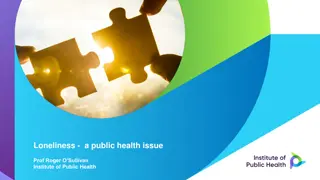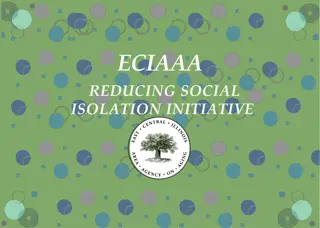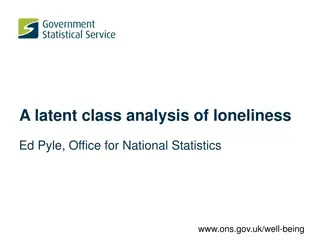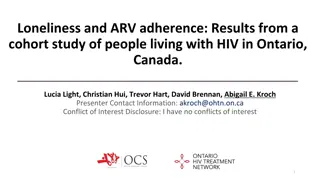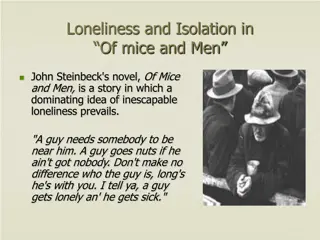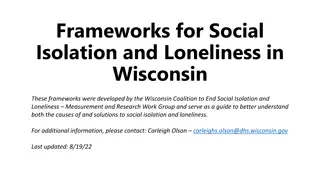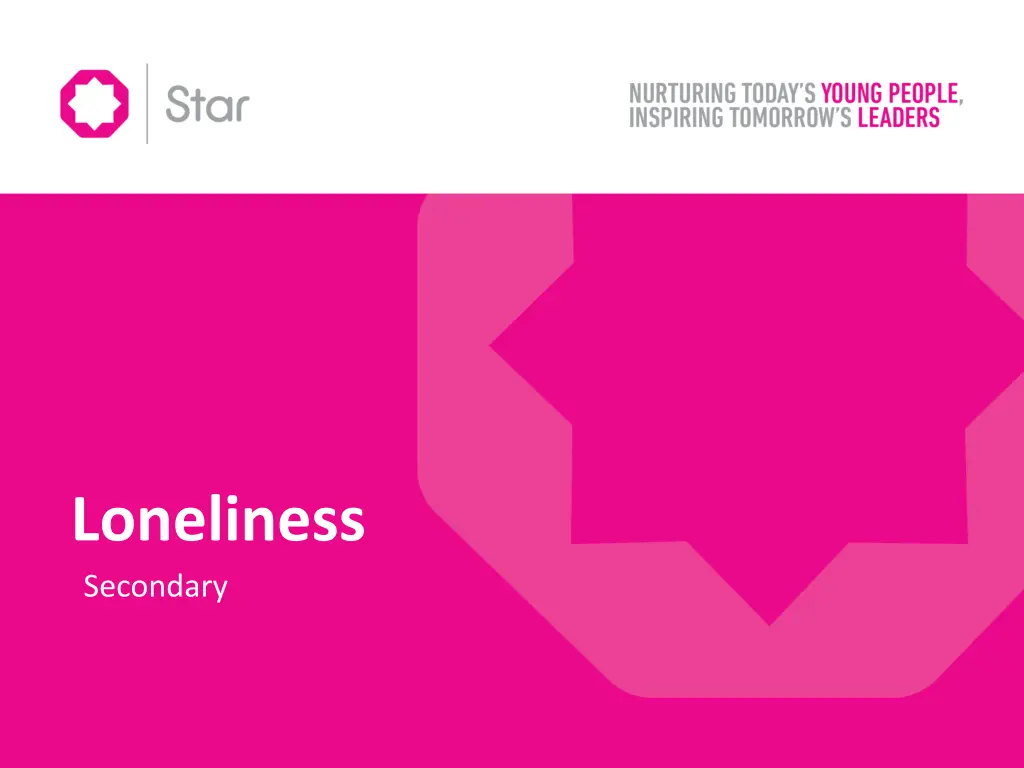
Understanding Loneliness and Its Impact on Mental Health
Loneliness is a complex emotion that affects individuals differently, irrespective of their social surroundings. It can lead to various mental health issues, impacting academic performance, motivation, social interactions, and even physical health. Addressing loneliness is crucial to prevent potential long-term risks such as exploitation and radicalization among young people.
Download Presentation

Please find below an Image/Link to download the presentation.
The content on the website is provided AS IS for your information and personal use only. It may not be sold, licensed, or shared on other websites without obtaining consent from the author. If you encounter any issues during the download, it is possible that the publisher has removed the file from their server.
You are allowed to download the files provided on this website for personal or commercial use, subject to the condition that they are used lawfully. All files are the property of their respective owners.
The content on the website is provided AS IS for your information and personal use only. It may not be sold, licensed, or shared on other websites without obtaining consent from the author.
E N D
Presentation Transcript
Loneliness Secondary
What is loneliness? Loneliness is a very personal emotion which affects everyone differently and is not necessarily related to being alone. It is perfectly possible to be on your own and not feel lonely, and equally possible to be surrounded by people and feel very lonely.
How does loneliness affect young people? A group of young people were asked What does loneliness mean to you? They answered: Not being able to relate to others. Like I could disappear, and no- one would notice. Being physically present but emotionally unreachable. Left out from the world.
Loneliness can affect every part of our life Here are some examples of this: Z is bright but is underachieving academically; the stress of feeling lonely is affecting his focus and concentration. S is becoming depressed and finds it hard to get motivated for anything. M looks at social media and feels even more lonely when she sees other people sharing photos of fun times with friends and family. C feels socially isolated and is starting to develop symptoms of depression. J has low self-esteem; he is not very open to making new friendships as he doesn t think people will be interested in him. O has high levels of social anxiety and he rarely interacts with other people.
Loneliness can affect every part of our life LONELINESS INCREASES THE BODY S STRESS LEVELS, WHICH HAS AN IMPACT ON HOW WELL WE CAN FUNCTION. HERE ARE SOME EXAMPLES OF THIS. R S GENERAL WELLBEING IS POOR AND ANXIETY ABOUT BEING LONELY MAKES HIM REGULARLY FEEL SICK. M DOESN T EAT WELL; SOMETIMES HE FEELS SO WORRIED THAT HE DOESN T EAT AT ALL, OR HE EATS TO MAKE HIMSELF FEEL BETTER. H IS OFTEN TIRED; SHE DOESN T SLEEP WELL AND USUALLY WAKES IN THE NIGHT WORRYING ABOUT THE FOLLOWING DAY.
Longer-term effects of loneliness > R feels like no-one understands him, so when an older woman starts talking to him online, complimenting him and promising gifts, R is at risk of grooming and child sexual exploitation (CSE). > Z has been excluded by her group of friends and feels lonely. Some new friends invite her to a party and encourage her to take drugs. They say she is part of their group and ask her to deliver a package for them. Z is at risk of child criminal exploitation (CCE). > B has recently moved and isn t making friends at college. He is approached by a group of guys who make him feel cool and popular. They talk a lot about extreme political ideas and tell B he should think about some of their views. Blake is at risk of being radicalised.
Overcoming loneliness Having someone to talk to An adult with an empathetic ear such as a parent, friend or school staff can prompt a friendly chat. Strengthening family relationships Being able to spend quality time with family helps a child to have a sense of place within it. Strong relationships Helping young people to develop peer relationships and friendships, especially if they might find this difficult for any reason (for example, being in care). Positive adult role models Finding opportunities for children and young people to spend time with caring and inspiring adults is a good way to influence behaviour and attitude. Spending time outside or with animals Both improve wellbeing which reduces the risk of loneliness. Ensuring a good diet, staying hydrated and getting enough sleep Good physical health means that a young person is less likely to feel lonely. Online support Online communities are a great way to reach out to others with similar
Where can I get help in school? >Talk to your Learning Coordinator >Talk to your Head of Year >Talk to any trusted adult in school >Talk to your friends >We are here to help, ask for help
STAR Vision and Values Nurturing Today s Young People, Inspiring Tomorrow s Leaders . Service Being a responsible citizen in our community. Teamwork Working together for excellence. Ambition Aspiring to be our best. Respect Treating others as we wish to be treated.



